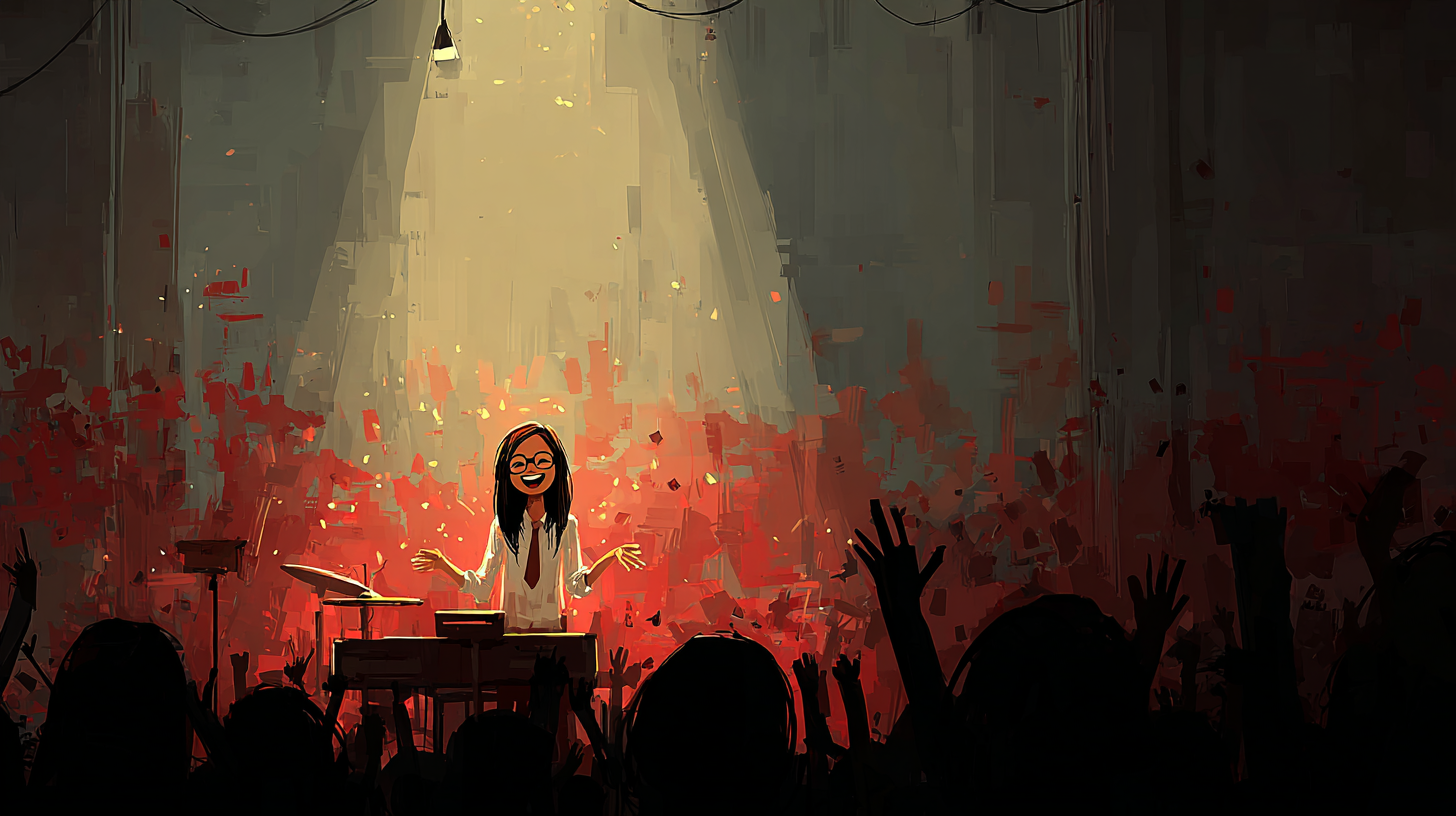“Thrill” means a strong feeling of excitement or to make someone feel very excited.
thrill は、心がワクワクしたりドキドキする気持ちや、そのようにさせることを表す単語です。
以下は英単語 “thrill” に関するストーリー型学習コンテンツです。まずは大枠の意味を理解して最後の文章で確認しましょう。
「thrill」の主な意味(main meaning)
| 品詞 | 定義(簡潔) | 発音記号 | 英語例文 |
|---|---|---|---|
| 名詞 (noun) | わくわくする気持ち・スリル | /θrɪl/ | She felt a thrill of excitement before the show. |
| 動詞 (verb) | わくわくさせる・ぞくぞくさせる | /θrɪl/ | The roller coaster thrilled the riders. |
「thrill」の語源(etymology)
“Thrill” は古英語の “thyrlian”(穴を開ける) に由来します。この語源から、「心に強く刺さるような感情」「胸を突き刺すようなわくわく感」というコアイメージが生まれました。
「thrill」の類義語(synonyms)
| 類義語 | 英文例文 |
|---|---|
| excitement | The excitement before the concert was amazing. |
| exhilaration | Skydiving gave her a sense of exhilaration. |
| delight | He smiled with delight when he saw his birthday cake. |
| joy | The children shouted with joy at the surprise gift. |
| elation | Winning the prize filled her with elation. |
「thrill」の反義語(antonyms)
| 反義語 | 英文例文 |
|---|---|
| boredom | The long lecture was full of boredom. |
| disappointment | He felt deep disappointment when he lost the game. |
「thrill」のコロケーション(collocations)
| コロケーション | 英文例文 |
|---|---|
| a thrill of excitement | A thrill of excitement ran through the crowd. |
| a real thrill | Riding a horse for the first time was a real thrill. |
| the thrill wears off | The thrill of the new job wore off after a few months. |
| thrill seeker | He’s a thrill seeker who loves extreme sports. |
| give someone a thrill | The surprise party gave her a big thrill. |
「thrill」の2項表現(binomials)
| 2項表現 | 英文例文 |
|---|---|
| thrills and spills | The theme park offered plenty of thrills and spills. |
| ups and downs | Life is full of ups and downs, but it’s still thrilling. |
英語ストーリー(english story)
Title: The First Performance
Saki had always dreamed of performing on stage. When she got the chance to act in her school’s drama club, she was filled with a thrill of excitement. The rehearsals were long, but every moment brought her joy and delight. Her teacher told her, “This will be a real thrill for the audience.”
On the day of the performance, she peeked behind the curtain. Her heart beat faster. “Why do I feel like this?” she asked her friend.
“You’re just feeling the thrill,” he said. “It means you care.”
As the curtain rose, Saki stepped forward. The lights were bright, and she saw her parents smiling. She spoke her lines clearly. Every clap from the audience gave her a new wave of excitement.
After the show, her teacher said, “You were amazing. The whole audience felt it.”
“That was the best moment of my life,” Saki said. “I think I’ve become a bit of a thrill seeker now.”
But a few weeks later, she found herself missing that feeling. The thrill wore off, and daily life felt normal again. Still, the memory stayed.
Saki learned that life has its ups and downs, but the special moments—the ones that bring a real thrill—are worth waiting for.
和訳
タイトル:初めての舞台
サキはずっと舞台で演じることを夢見てきました。学校の演劇部で役をもらえたとき、彼女は**thrill(スリル:ワクワクする気持ち)でいっぱいになりました。リハーサルは長く続きましたが、そのすべての瞬間がjoy(喜び)とdelight(うれしさ)をもたらしました。先生は言いました。「これは観客にとってreal thrill(本物のスリル)**になるよ。」
公演の日、サキはカーテンの後ろからのぞきました。心臓が速く鼓動します。「どうしてこんな気持ちになるの?」と友だちに尋ねました。
「それは**thrill(スリル)**だよ」と彼は答えました。「それは君が大事にしてるってことさ。」
カーテンが開き、サキは前に進みました。ライトが明るく、両親の笑顔が見えました。彼女ははっきりとセリフを話しました。観客の拍手が**excitement(興奮)**の波を何度も彼女に与えました。
ショーの後、先生は言いました。「素晴らしかったよ。観客みんなが感じていた。」
「人生で一番の瞬間だった」とサキは言いました。「もう**thrill seeker(スリルを求める人)**になっちゃったかも。」
でも数週間後、彼女はあの気持ちが恋しくなりました。thrill wore off(スリルは消えた)、日常が普通に戻ってきました。でもその思い出は残りました。
サキは、人生には**ups and downs(良い時も悪い時も)があるけれど、特別な瞬間――本物のthrill(スリル)**を感じられる瞬間――は待つ価値があると学んだのです。
「thrill」のQ&A
- Q「excitement」と「thrill」の違いは何ですか?
- A
「excitement」は広く使える「興奮」を意味し、長時間続く期待や喜びを指すことが多いです。一方「thrill」は短くて強烈なワクワク感やドキドキ感を指し、瞬間的な感情を表すことが多いです。
- Q「delight」は「thrill」と同じ意味ですか?
- A
「delight」は「喜び」や「大きな満足感」を表しますが、「thrill」はもっと体に感じるような強い興奮を指します。どちらもポジティブですが、感情の種類が少し違います。
- Q「joy」と「thrill」の違いは何ですか?
- A
「joy」は心からの幸せや嬉しさを表し、「thrill」はそれに加えて、体がゾクゾクするような刺激的な感覚を含みます。感情の深さよりも、刺激の強さが「thrill」の特徴です。
- Q「boredom」はなぜ「thrill」の反対語になりますか?
- A
「boredom(退屈)」は心が動かない状態を意味し、「thrill(スリル)」のような心が大きく動く感情とは正反対です。刺激が全くない状態なので、対義語として使われます。
- Q「disappointment」は「thrill」とどう反対ですか?
- A
「disappointment(がっかり)」は期待していたことがうまくいかなかったときの否定的な感情です。「thrill」は期待や驚きがうまくかみ合ったときに生じるポジティブな感情なので、反対の意味になります。
- Q「a thrill of excitement」はどういう意味ですか?
- A
「a thrill of excitement」は「ワクワクするような強い興奮」を意味し、嬉しい期待や高揚感が一瞬にして感じられるときに使います。
- Q「a real thrill」はどんなときに使いますか?
- A
「a real thrill」は、「本当にわくわくする体験」や「心から興奮する出来事」を表すときに使います。強いポジティブな感情を強調したいときに使います。
- Q「the thrill wears off」はどういう意味ですか?
- A
「the thrill wears off」は、「最初のワクワク感が消えていく」「慣れてしまって感動が薄れる」という意味です。新しいことに最初だけ興奮する状況によく使います。
- Q「thrill seeker」とはどういう人ですか?
- A
「thrill seeker(スリルを求める人)」は、スカイダイビングやジェットコースターなど、危険やスリルのある体験を好む人のことを指します。
- Q「give someone a thrill」はどう使いますか?
- A
「give someone a thrill」は、「人をわくわくさせる」「とても興奮させる」という意味で、サプライズや特別な体験を通じて使われます。



コメント